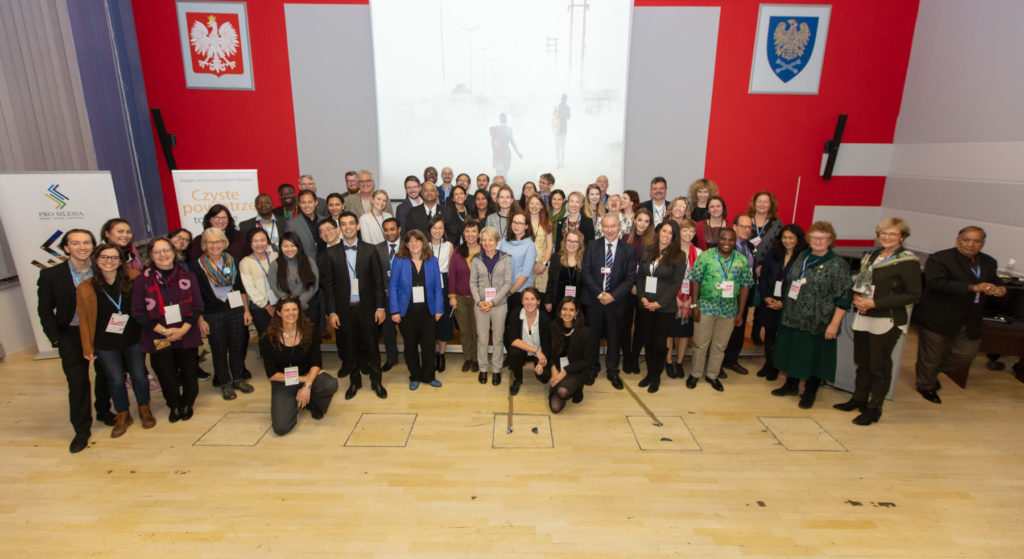Climate change, environmental pollution and biodiversity loss affect people’s health and generate multi-billion-euro economic losses, as a briefing produced by HEAL Poland under the patronage of the Institute of Water Economy and Meteorology of the National Research Institute and the Polish Federation of Asthma, Allergy, and COPD Patients Associations highlights.
The topic of health impacts from climate is one that has not been very widely discussed in Poland until now, but the landscape has recently changed. One of the reasons was a conference organised by HEAL Poland in the framework of COP24, gathering national health experts to speak about public health consequences from climate change that are already being noticed by citizens and the health sector.
 Entitled “Climate change and health. Challenges for the health sector in Poland”, the conference was organised by HEAL Polska in partnership with the Global Climate and Health Alliance (GCHA), the Pro Silesia association and the Polish Climate Coalition on the occasion of the COP24 Climate Summit in Katowice. On 8 December, public health experts, doctors, scientists, representatives of local governments, non-governmental organisations and interested public gathered in the rectorate of the University of Silesia, on the 8th of December.
Entitled “Climate change and health. Challenges for the health sector in Poland”, the conference was organised by HEAL Polska in partnership with the Global Climate and Health Alliance (GCHA), the Pro Silesia association and the Polish Climate Coalition on the occasion of the COP24 Climate Summit in Katowice. On 8 December, public health experts, doctors, scientists, representatives of local governments, non-governmental organisations and interested public gathered in the rectorate of the University of Silesia, on the 8th of December.
During the conference there were raised numerous areas of climate change health consequences and their meaning for health sector, as well as the national budget. Speakers stressed issues such as air pollution, droughts, vector and other environmental diseases, extreme weather patterns, heat waves, floods and the many other consequences of climate change that we expect to experience in Europe. Additional focus was put on the public health service and whether it is prepared for an increased number of patients bearing the impacts of climate health consequences.
“The health consequences of climate change are countless, and the attempt to determine the amount of external health costs will always be underestimated” said Weronika Michalak (HEAL Poland). “but what we do know for certain is that they will pose new challenges for doctors and the entire health sector.”
Having this conversation is especially important in Poland, where already twelve million people suffer from some form of allergy and around 50,000 people die prematurely every year due to bad air quality. The country is host of the biggest and most polluting coal power plant in Europe – Bełchatów. Polish CO2 emissions stand for 1% of the world wide emissions.
And Silesia – where both COP24 and the HEAL took place is the Polish region with the biggest history of coal mining but that is undergoing a significant energy transformation: “We talk about Silesia as black, white and green. Black is what we associate with mines, white refers to the north of Upper Silesia, with large amount of limestone. Green means the large amount of greenery which plays a very important role in environmental protection” explained Jacek Kozakiewicz, Vice CPesident of the Supreme Medical Council, a member of the Standing Committee of European Doctors.
Speakers included
- Dr Maria Neira from WHO, Department of Public Health, Environment and Social Determinants
- National Consultant of Public Health Prof. Wojciech Hanke,
- Member of board of Polish Society of Lung Diseases Prof. Tadeusz Zielonka, Gdańsk Medical University
- Public health specialist Dr Tadeusz Jędrzejczyk,
- Andrzej Lekston from Silesian Heart Disease,
- Zbigniew Karaczun from Polish Climate Coalition,
- Dr hab. Rafał Gierczyński from National Institute of Public Health,
- Dr Piotr Dąbrowiecki from Federation of Patients Suffering from Asthma, Allergy and COPD,
- Dr Jacek Kozakiewicz fromSupreme Medical Council
- Alex Simidchev from Bulgarian Coalition Air4Health referred to issues.
The conference was followed by the “Global Health and Climate Summit”, organised by the Global Climate and Health Alliance in partnership with, among others, HEAL and the World Health Organization.

